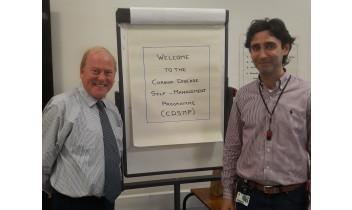
My experiences of co-tutoring
We spoke to Matt Cullen about his experience as a co-tutor on the Chronic Disease Self-Management Programme (CDSMP) designed by Stanford University to run in local communities.
What is the Chronic Disease Self-Management Programme?
The Chronic Disease Self-Management Programme (CDSMP) was developed by a team of researchers at Stanford University. It is a group, skills-based programme that aims to help adults with chronic health conditions to better manage their condition(s). The course is led by both a healthcare professional and an individual with a chronic condition.
Participants attend 2.5 hours workshops once a week for six weeks and some of the topics covered are:
- Addressing the physical and psychological effects of chronic disease (including fatigue, pain, depression and frustration).
- Exercising, getting proper nutrition and using medications appropriately
- Communicating effectively with family, friends and health professionals.
I was diagnosed with Idiopathic Pulmonary Fibrosis (IPF) in 2010 and am a volunteer with the Irish Lung Fibrosis Association (ILFA) in Dublin, Ireland. Following my participation in an ILFA event at the Irish Parliament in 2015, I was nominated to take part in the CDSMP as a patient participant. The programme was taking place at the Mater Hospital in Dublin and it was free for me to attend as I was informed a pharmaceutical company sponsored the event. I found the course useful in helping me to self-manage my condition and in 2018, I was asked if I would co-run a CDSMP event with a psychologist from the Mater Hospital. I decided to give it a go.
What training did you receive to become a co-tutor?
I received 4-days of intensive training which was facilitated by two Stanford-certified trainers (a clinical psychologist and a patient leader with a chronic condition). It is essential that patients and healthcare professionals are trained together to deliver the programme and the course cannot be run by healthcare professionals only. There was also the option of receiving accreditation for the training, which some patient tutors may value but this was not something of particular interest to me.
Who were the participants on the course?
The course was provided free of charge to patients with a chronic illness who were attending the Mater Hospital in Dublin. All the participants had chronic medical conditions such as multiple sclerosis, IPF, fibromyalgia, and parkinsons disease.
Some found it hard to attend over the six weeks due to the distance they had to travel and/or problems they encountered with their illness or medical appointments they needed to attend, which resulted in some participants not finishing the course.
How was the programme run?
Our event took place in a classroom in the hospital complex in a bright, quiet, airy and spacious room with toilet facilities close by. This worked well for our course - the choice of venue is so important to ensure a welcoming and pleasant environment for the participants attending. The programme itself was very interactive with short talks, discussions, role play, problem solving and action planning on the topics covered (which were outlined in the course manual). I also recorded feedback from participants on flipcharts and arrived early to greet participants when they arrived.
Did you feel that your role as co-tutor was important?
I believe my role was important as when the participants found out that I was a volunteer tutor, they reacted very positively and appreciated that I would commit myself to helping them in this way. They also told me that it helped having a person with a chronic illness as a co-tutor because they felt a genuine empathy with their chronic condition(s).
Did you face any challenges?
I had a flare-up of rheumatoid arthritis and lung health issues during a few sessions and I was in pain and felt unwell, which made it difficult for me. The healthcare professional trainer was very reassuring and there was an additional healthcare professional in attendance throughout the course in case any help was required. I also believe this experience helped participants to relate to me because of the regular (or daily) pain some of them also experience due to their chronic illness.
What did you enjoy the most?
I always love helping others and to have a positive influence for participants and to treat them with courtesy, respect and give them the opportunity to better self-manage their chronic illnesses was for me the most enjoyable aspects. I also found some of the participants very inspiring including the effort some of them had to make to attend the sessions.
How would you sum up your experience?
It is not a course that may suit everyone because it is set up to run tightly to the content of the course manual and at times, I felt longer discussions might have been of benefit. This of course is a balance as the time for each session is tight. The practical emphasis on action planning and problem solving is one of the key strengths of the programme.
I have been asked to co-tutor another CDSMP event due to start Monday 12 November 2018 which is great news as overall I feel it is a good course, especially if patients attending it feel they can do more, or have more control over, their chronic condition on completion of the programme.
More information about CDSMP at: https://www.selfmanagementresource.com/
Photo shows Matt Cullen (left) and Dr Damien Lowry (right)